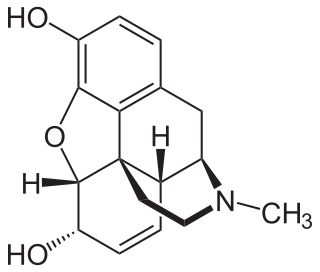Related Research Articles

Heroin, also known as diacetylmorphine and diamorphine among other names, is an opioid used as a recreational drug for its euphoric effects. Medical grade diamorphine is used as a pure hydrochloride salt which is distinguished from black tar heroin, a variable admixture of morphine derivatives—predominantly 6-MAM (6-monoacetylmorphine), which is the result of crude acetylation during clandestine production of street heroin. Diamorphine is used medically in several countries to relieve pain, such as during childbirth or a heart attack, as well as in opioid replacement therapy. It is typically injected, usually into a vein, but it can also be smoked, snorted, or inhaled. In a clinical context the route of administration is most commonly intravenous injection; it may also be given by intramuscular or subcutaneous injection, as well as orally in the form of tablets. The onset of effects is usually rapid and lasts for a few hours.

Harm reduction, or harm minimization, refers to a range of public health policies designed to lessen the negative social and/or physical consequences associated with various human behaviors, both legal and illegal. Harm reduction policies are used to manage behaviors such as recreational drug use and sexual activity in numerous settings that range from services through to geographical regions.
Drug rehabilitation is the process of medical or psychotherapeutic treatment for dependency on psychoactive substances such as alcohol, prescription drugs, and street drugs such as cannabis, cocaine, heroin or amphetamines. The general intent is to enable the patient to confront substance dependence, if present, and cease substance abuse to avoid the psychological, legal, financial, social, and physical consequences that can be caused, especially by extreme abuse.

Opioid use disorder (OUD) is a substance use disorder relating to the use of an opioid. Any such disorder causes significant impairment or distress. Signs of the disorder include a strong desire to use opioids, increased tolerance to opioids, difficulty fulfilling obligations, trouble reducing use, and withdrawal symptoms with discontinuation. Opioid withdrawal symptoms may include nausea, muscle aches, diarrhea, trouble sleeping, agitation, and a low mood. Addiction and dependence are components of a substance use disorder. Complications may include opioid overdose, suicide, HIV/AIDS, hepatitis C, and problems at school, work, or home.

The National Institute on Drug Abuse (NIDA) is a United States federal-government research institute whose mission is to "advance science on the causes and consequences of drug use and addiction and to apply that knowledge to improve individual and public health."
Substance dependence, also known as drug dependence, is an adaptive state that develops from repeated drug administration, and which results in withdrawal upon cessation of drug use. A drug addiction, a distinct concept from substance dependence, is defined as compulsive, out-of-control drug use, despite negative consequences. An addictive drug is a drug which is both rewarding and reinforcing. ΔFosB, a gene transcription factor, is now known to be a critical component and common factor in the development of virtually all forms of behavioral and drug addictions, but not dependence.

Sam Sullivan, CM is a Canadian politician who previously served as the MLA for Vancouver-False Creek. Previously, he served as the Minister of Communities, Sport and Cultural Development with responsibility for Translink in the short-lived BC Liberal government after the 2017 election, as well as the 38th mayor of Vancouver, British Columbia, Canada and has been invested as a member of the Order of Canada. He is currently President of the Global Civic Policy Society and Adjunct Professor with the UBC School of Architecture and Landscape Architecture.

Insite is the first legal supervised drug injection site in North America, located at 139 East Hastings Street, in the Downtown Eastside (DTES) neighbourhood of Vancouver, British Columbia. The DTES had 4700 chronic drug users in 2000 and has been considered to be the centre of an "injection drug epidemic". The site provides a supervised and health-focused location for injection drug use, primarily heroin. The clinic does not supply any drugs. Medical staff are present to provide addiction treatment, mental health assistance, and first aid in the event of an overdose or wound. In 2017, the site recorded 175,464 visits by 7,301 unique users; 2,151 overdoses occurred with no fatalities, due to intervention by medical staff. The site also offers a free checking service so clients can check their substances for fentanyl and carfentanil. Health Canada has provided $500,000 per year to operate the site, and the BC Ministry of Health contributed $1,200,000 to renovate the site and cover operating costs. Insite also serves as a resource for those seeking to use a harm reduction approach for people who inject drugs around the world. In recent months and years, delegations from a number of countries are on record touring the facility, including various U.S. states, Colombia and Brazil.
A drug policy is the policy, usually of a government, regarding the control and regulation of psychoactive substances, particularly those that are addictive or cause physical and mental dependence. Governments try to combat drug addiction or dependence with policies that address both the demand and supply of drugs, as well as policies that mitigate the harms of drug use, and for medical treatment. Demand reduction measures include voluntary treatment, rehabilitation, substitution therapy, overdose management, alternatives to incarceration for drug related minor offenses, medical prescription of drugs, awareness campaigns, community social services, and support for families. Supply side reduction involves measures such as enacting foreign policy aimed at eradicating the international cultivation of plants used to make drugs and interception of drug trafficking, fines for drug offenses, incarceration for persons convicted for drug offenses. Policies that help mitigate drug use include needle syringe programs and drug substitution programs, and free facilities for testing a drug's purity.
Bertha K. Madras is a professor of psychobiology in the Department of Psychiatry and the chair of the Division of Neurochemistry at Harvard Medical School, Harvard University; she served as associate director for public education in the division on Addictions at Harvard Medical School. Madras has published research in the areas of drug addiction, ADHD, and Parkinson's disease.
The drug policy of Portugal called "The drug strategy", was put in place in 2000, and was legally effective from July 2001. Its purpose was to reduce the number of new HIV/AIDS cases in the country, as it was estimated around half of new cases came from injecting drug use.
Herbert David Kleber was an American psychiatrist and substance abuse researcher. His career, centered on the evidence-based treatment of addiction, focused on scientific approaches in place of punishment and moralisms. His career focused on pathology of addiction to help patients reduce the severe discomforts of withdrawal, avoid relapse and stay in recovery.

Heroin-assisted treatment (HAT), or diamorphine assisted treatment, refers to the prescribing of semi-synthetic heroin to opiate addicts who do not benefit from or cannot tolerate treatment with one of the established drugs used in opiate replacement therapy like methadone or buprenorphine. For this group of patients, heroin-assisted treatment has proven superior in improving their social and health situation. It has also been shown to save money, as it significantly reduces costs incurred by trials, incarceration, health interventions and delinquency. It has also drastically reduced overdose deaths in the countries utilizing it, as patients take their dose in a controlled, professionally supervised setting, and Narcan (naloxone) is on hand in the case of an accidental overdose. Opiate related overdoses in the U.S. kill around 70,000 people per year.
Marie Nyswander was an American psychiatrist and psychoanalyst known for developing and popularizing the use of methadone to treat heroin addiction.
Methadone maintenance treatment is the use of methadone, administered over a prolonged period of time, as treatment for someone who is addicted to opioids such as heroin, where detoxification has been unsuccessful and/or admittance to a substance abuse treatment facility requires complete abstinence. "Methadone maintenance makes possible a first step toward social rehabilitation" because it allows addicts to avoid the uncomfortable withdrawal symptoms that result from complete abstinence. Methadone maintenance can also be used for patients who suffer with severe pain problems that are resistant to other drugs.
Martin T. Schechter is a Canadian epidemiologist recognized for contributions to HIV research, prevention and treatments and to addiction research. He is a professor and the former founding director of the School of Population and Public Health in the Faculty of Medicine at the University of British Columbia (UBC). Schechter received his Order of British Columbia in 1994 alongside BC's first Nobel Prize laureate Michael Smith. He now serves as Chief Scientific Officer of the Michael Smith Foundation for Health Research.
Beny Jene Primm was a prominent American physician, HIV/AIDS researcher, lecturer and advocate for public health policy reform.

The opioid epidemic refers to the extensive overuse of opioid medications, both from medical prescriptions and from illegal sources. The epidemic began in the United States in the late 1990s, when opioids were increasingly prescribed for pain management and resulted in a rise in overall opioid use throughout subsequent years.
Discrimination against drug addicts is a form of discrimination against individuals who suffer from a drug addiction. In the process of stigmatization, drug addicts are stereotyped as having a particular set of undesirable traits, in turn causing other individuals to act in a fearful or prejudicial manner toward them. Drug use discrimination also leads to many users being secretive about drug use. As it relates to healthcare stigmatizing attitudes surrounding drug use can cause barriers to treatment uptake and engagement. In some of its manifestations, discrimination against drug addicts involves a violation of human rights.

Tim Ryan is an American activist, drug abuse interventionist, author and speaker. He is the Founder and Executive director of “A Man in Recovery” foundation. According to the National Safety Council, Ryan is notable for his position in favor of Drug policy reform and as a proponent of legislative change in American drug policy. His work was the subject of the A&E series “Dope Man” in July 2017. Ryan is also the author of the book “From Dope to Hope: A Man in Recovery” published in 2017.
References
- ↑ "Drug substitution and maintenance treatment" (PDF). Council. Vancouver. Retrieved 3 September 2017.
- ↑ "Vancouver Drug program raises controversy". The Canadian Encyclodedia, Macleans 2007.
- ↑ "Vancouver combats heroin by giving its addicts the best smack in the world". PRI world.
- ↑ "Vancouver researchers find pain medication can work as treatment for severe heroin addiction". The Georgia Straight.
- ↑ "Supports for addictions reaserch". University of British Columbia.
- ↑ "SALOME".
- ↑ "Handing Heroin to Addicts" (PDF). National Post.
- ↑ "Wait-are you sure we're talking about the same John Reynolds?". Macleans.
- ↑ "Sam Sullivan speaks about SALOME". AHA Media. Retrieved 4 September 2017.